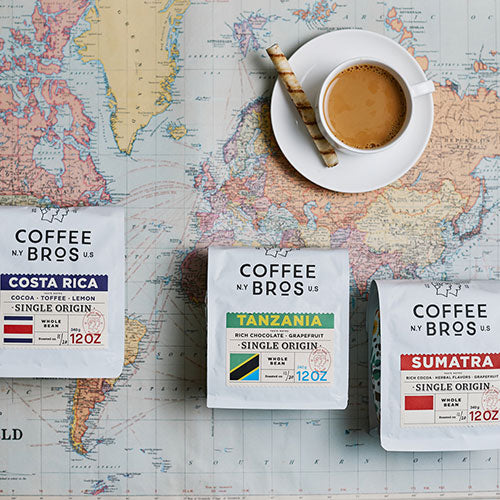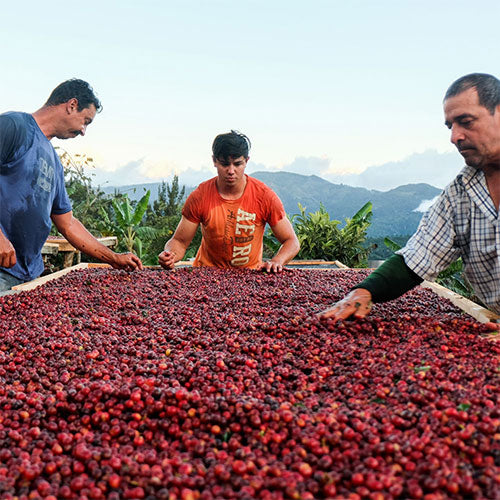What Does Honey Process Coffee Mean?
Why do coffees taste so different?
Many factors contribute to the taste of your coffee, one being post-harvest processing methods. Before we dive into the world of post-harvest processing, let's look at the factors that influence the taste of your coffee:
- Terroir: the complete natural environment in which a particular coffee is produced, including factors such as the soil, topography, and climate.
- Varietal: the species of plant
- Ripeness: the ripeness of the coffee cherry when harvested (also the proper sorting of under or overripe cherries)
- Post-harvest Process Method: the method used to extract the coffee bean from the coffee cherry (natural, washed, wet-hulled, honey).
The post-harvest processing method of the coffee (Natural, Washed, Honeyed, etc.) is one of the most significant factors in a coffee's profile and underlying taste characteristics. Though excellent tasting coffee comes from all processing methods, you might find specific processing methods more suited to your palette.
Washed Process
Natural Process
Honey Process
Coffee Processing by Country
Post-harvest process methods differ by country, primarily due to tradition. Still, we can see that landscape changing due to experimentation and the desire from producers to create more unique tasting coffees.
You will also find that coffees labeled as a specific process do not mean they were handled the same way by all producers. The lack of uniformity is because producers are constantly experimenting within the bounds of a particular processing method and the terms that identify each are somewhat loosely defined.
Now, onto honey processed coffee, what it is, how it tastes, and where you can find some.
What is Honey Processed Coffee?
Your first thoughts might be that honey processed coffee uses honey, or maybe it tastes like honey? Well, neither are correct (though some coffee can have taste notes of honey), as the process name comes from the sticky mucilage layer under the pulp of the coffee cherry.
What is unique about honeyed processed coffees is the retention of the mucilage layer during the initial drying stages. This mucilage layer imparts a great deal of flavor to the coffee during processing, and you'll find honey coffees to have a heavier body, sweet fruitiness, and a moderate acidity level.
The honey process also has several variations, and those include:
- Yellow Honey: Coffee turned hourly on raised beds for a few days, then transferred to a greenhouse and turned regularly.
- Red Honey: Coffee is turned several times a day and dried for longer in the greenhouse.
- Black Honey: Coffee turned once a day with maximum mucilage retention.
The basic summary of the honey process:
- Method: The honeyed process is a mix of both Natural and Washed methods. It involves an immediate removal of the cherry (but not the mucilage) and then a drying period.
- Drying Time: 18 – 25 days on average (turned daily in some cases)
- Profile: Retains some of the desirable characteristics of the Natural process like heavier body, sweet fruitiness, but carries a lower acidity and can have caramel or burnt sugar sweetness.
A Special Honey Processed Coffee:
The most special honey processed coffee we have ever tasted comes from the Finca Idealisa farm in Nicaragua. We have cupped some wild coffees, but Mango and Pineapple were two taste notes that we never expected to come across.
Finca Idealist used the "Black Honey" method but went one step further and segmented portions of each lot that tasted mango. They call the entirety of this process their unique "Mango Honey" process.
How does Finca Idealista achieve these taste notes:
Finca Idealista has the four most crucial elements to creating award-winning and unique tasting coffee:
- Altitude: Grown at a high altitude (1,200 MASL and above)
- Varietal: Varietals that are fruit-forward and sweet (Pacas and Cattura)
- Terroir: Proximity to a private nature reserve (great for shade and an excellent natural cool breeze)
- Processing Method: Unique processing method with rigorous quality control (Mango Honey process)
"Our honey processed coffees are grown next to the rainforest, which provides the coffee with the needed shade and a cool breeze.
Once we depulp the coffee, we begin the sun-drying process to help keep the mucilage and flavor intact. Much of the fruitness found in this coffee is due to its variety (Pacas and Cattura), the altitude grown at (1,200 MASL), the proximity to a private nature reserve, and ripe picking.
Lastly, our Q grader cups every day and often re-sample roasting to identify which lots are unique, fruit-forward, and hit the intended mango notes."
Conclusion:
Honey processed coffees are truly unique and are among the sweetest coffees we have ever tried. Unique processing variations of the Honey Process like the "Black Honey" can create out-of-this-world flavor profiles like the one found in the Finca Idealista "Mango Honey" coffee.
If you are looking for something different, we suggest finding a roaster who also sources unique processing methods like honey.




